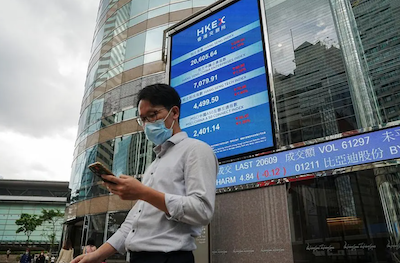Markets in Asia made mixed moves on Friday, as rate cut optimism boosted investor sentiment, but concern about possible US action against Chinese battery-makers weighed on Hong Kong and Shanghai.
Market moves were largely subdued as traders stayed on guard ahead of the US nonfarm payrolls report.
Still, as of closing, Asian markets snapped a two-week losing streak after major central banks kick-started their rate easing cycles.
Also on AF: CATL, Gotion Under Scrutiny in US Over ‘Use of Forced Labour’
The European Central Bank (ECB) delivered a well-telegraphed rate cut on Thursday, a day after the Bank of Canada became the first G7 nation to trim its key policy rate.
The two joined Sweden’s Riksbank and the Swiss National Bank in beginning their respective monetary easing cycles.
Those moves added to optimism that the US Federal Reserve could soon follow suit and breathed new life into the global risk rally.
MSCI’s broadest index of Asia-Pacific shares outside Japan rose 0.3% and was on track to end the week nearly 3% higher, though some of its gains were capped by a sell-off in Chinese stocks.
Payroll data weighs on Japan
Meanwhile, Japan’s Nikkei share average was little changed, closing at 38,683.90, down 0.05% on the day. For the week, it rose 0.44%.
The broader Topix was also largely flat, inching down 0.08% to 2,755.03. The index posted a 0.63% loss for the week.
Investors sought further direction from a key US jobs report due later in the day and central bank meetings in the United States and Japan next week.
“It was hard for investors to actively buy stocks ahead of key data and events,” Jun Morita, general manager of the research department at Chibagin Asset Management, said.
“Particularly, the market was cautious about what sort of message the Bank of Japan (BOJ) would send when the global central banks are on track for rate cuts.”
Softer payroll numbers from the US will also likely push 10-year Treasury yields.
“Equities, in all likelihood, would rally strongly on that, and that would reflect across the region. You’ll likely see the dollar losing a little bit of strength from that,” Rob Carnell, ING’s regional head of research for Asia-Pacific, said.
Rising US-China tensions
China sat out of the global risk rally after a group of Republican lawmakers said that Chinese battery companies CATL and Gotion should be banned from shipping goods to the US.
That sent Chinese blue chips falling 0.8%, with the CSI 300 Index paring some gains to close 0.5% lower at 3,574.11. The Shanghai Composite Index, meanwhile, slipped 0.9% before recouping losses to close 0.08% higher at 3,051.28.
The development also weighed on technology shares In Hong Kong, with the Hang Seng Tech index sliding nearly 1.8%. The Hang Seng Index declined 0.6%.
The negative headlines overshadowed Friday’s data which showed China’s exports grew more quickly and for a second month in May, offering some relief to the economy as it battles to mount a durable recovery.
Yen strengthens, rupee steadies
In currency markets, the dollar hovered around eight-week lows ahead of payrolls data.
That strengthened Japan’s yen modestly, leaving the dollar 0.1% lower at 155.51 yen. The currency was on track for a loss of about 1.2% for the week, its largest weekly slide since late April, the point at which Japanese monetary authorities stepped into the market to prop up the yen.
The yen remains not far from the 34-year trough beyond 160 per dollar reached at the end of April, which prompted Japanese officials to spend about $62 billion intervening in the currency market to support it.
Both the government and BOJ are concerned that rising import costs will scupper a hoped-for cycle of moderate inflation and steady wage hikes.
Like the Fed, the Bank of Japan decides policy next week, and consensus is building in the market for an imminent reduction in its monthly bond purchases as a means of tightening credit conditions.
Meanwhile, the Indian rupee stabilised on Friday, after slumping close to an all-time low against the dollar. The currency traded at 83.47 to the dollar, after falling to 83.64 on Tuesday, when a shock election mandate in the Indian election sparked a massive sell-off in the country’s equities.
By Friday, however, India’s equity benchmarks rebounded from election result day losses and hit fresh all-time-highs as domestic investors piled on shares.
Key figures:
Tokyo – Nikkei 225 < DOWN 0.05% at 38,683.93 (close)
Hong Kong – Hang Seng Index < DOWN 0.59% at 18,366.95 (close)
Shanghai – Composite > UP 0.08% at 3,051.28 (close)
London – FTSE 100 < DOWN 0.50% at 8,244.29 (1307 GMT)
New York – Dow > UP 0.20% at 38,886.17 (Thursday close)
- Reuters, with additional editing by Vishakha Saxena
Also read:
Scamming Compounds in SE Asia Stole $64 Billion in 2023: Report
China Exports Rise in May, But Doubts Remain as Imports Slow
China’s Clean Energy Spending Set to Match US-Europe Combined
China Plans New Way to Measure Products’ Carbon Footprint
























